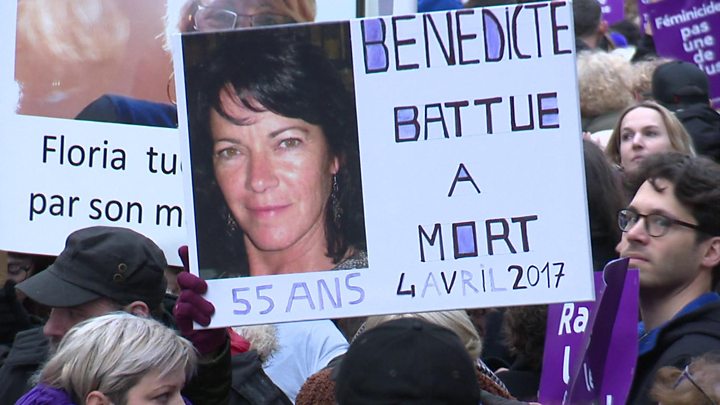France's silent problem has sparked a protest too loud to ignore.
The names and faces of women who seemed invisible when alive are being paraded after their deaths through France's streets, in a steady stream of protests against the high number of domestic killings here.
Support groups say that more than 130 women have been killed this year by a partner or ex-partner; that's one every three days.
Lucien Douib lost his daughter, Julie, in March. Her estranged husband is facing trial for her murder. He says it's important that the police are better prepared to help.
"When we talk with the families of the victims, it's always the same story," he told me.
"The women file a complaint but are not taken seriously, are not listened to. That's what happened with Julie. It's horrible to think that, in nine months since the death of my daughter, nothing has changed."
A report by the justice ministry last month found that almost half of those killed by their partners had previously filed a report with the police, but that 80% of the complaints did not lead to prosecution.

On Monday, after two months of government consultations, Prime Minister Edouard Philippe promised more training for the police in assessing complaints, and 1,000 extra spaces in emergency shelters for women fleeing domestic violence at home.
He also announced a new law, to go before the National Assembly in January, under which any partner who kills his companion will face the "automatic suspension of parental authority". Violent partners who fall short of murder could also face restrictions on parental authority for their children.
Lucien says he welcomes the move. He and his wife are now caring for their two grandchildren, but routinely need to ask permission from the man charged with killing their daughter, in order to travel with the children, or enrol them in any kind of medical or psychiatric care.
The government says it will also introduce a new law in January, allowing doctors to break patient confidentiality in cases of domestic violence if they think it would save lives.
And - in a new move focusing on those convicted of violence - it will co-fund new care centres in each region of France for the perpetrators themselves.
There is currently only one residential rehabilitation centre in France that caters to men convicted of domestic violence. Some 800 people have so far passed through the Rosati Home's four-week programme.
Using public money for schemes like this is controversial, but the home's director, Benoit Durieux, says it works.
"We have a reoffending rate of around 10%," he said. "In the absence of any follow up, it's more than 40%. Our hope is that the victims of domestic violence understand that it's possible to free themselves from the yoke of an abusive man; and the perpetrators can also understand that they can act differently."
There is scepticism and disappointment among some activists, who say that the government measures don't amount to very much. Many of them had been announced at the start of the consultation process two months ago.
"Count on me to mobilise the whole nation on this," President Macron tweeted.
But will it stem the growing list of women who found no-one they could count on? BBC